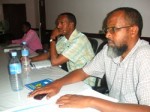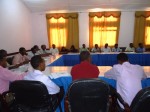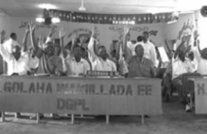Improving Government Accountability in Puntland
 In recent years, Puntland has formed its own government, which has the intention of joining the wider government of Somalia if and when it becomes stable. While the relative stability currently experienced in Puntland can largely be attributed to the region’s governmental structures, it is important to note that public officials are not democratically elected in Puntland, but rather appointed by clan leaders and elders, and as such have few directive incentives to act on behalf of the interests of average Somalis.
In recent years, Puntland has formed its own government, which has the intention of joining the wider government of Somalia if and when it becomes stable. While the relative stability currently experienced in Puntland can largely be attributed to the region’s governmental structures, it is important to note that public officials are not democratically elected in Puntland, but rather appointed by clan leaders and elders, and as such have few directive incentives to act on behalf of the interests of average Somalis.
Somali Family Services holds the firm belief that building a strong and positive relationship between civil society and government is key to achieving peace and stability in the country. As part of its ongoing work in promoting this relationship, SFS, supported by the National Endowment for Democracy (NED), is currently holding a series of six trainings for the 49 members currently serving on Garowe’s seven neighborhood committees. These neighborhood committees were established by SFS in 2008 and are responsible for bringing the concerns of neighborhood members to the Garowe government, and up to the Nugaal and Puntland governments when
key to achieving peace and stability in the country. As part of its ongoing work in promoting this relationship, SFS, supported by the National Endowment for Democracy (NED), is currently holding a series of six trainings for the 49 members currently serving on Garowe’s seven neighborhood committees. These neighborhood committees were established by SFS in 2008 and are responsible for bringing the concerns of neighborhood members to the Garowe government, and up to the Nugaal and Puntland governments when  appropriate. The six trainings being implemented by SFS are designed to improve the committee members’ knowledge of and skills in areas such as civic education, leadership, democracy and accountability. By improving participants’ skills in these areas, the trainings aim to improve the committee members’ capacity to advocate on behalf of their communities, and to foster a system in which Somali government officials are increasingly responsive to the needs of their constituents.
appropriate. The six trainings being implemented by SFS are designed to improve the committee members’ knowledge of and skills in areas such as civic education, leadership, democracy and accountability. By improving participants’ skills in these areas, the trainings aim to improve the committee members’ capacity to advocate on behalf of their communities, and to foster a system in which Somali government officials are increasingly responsive to the needs of their constituents.






